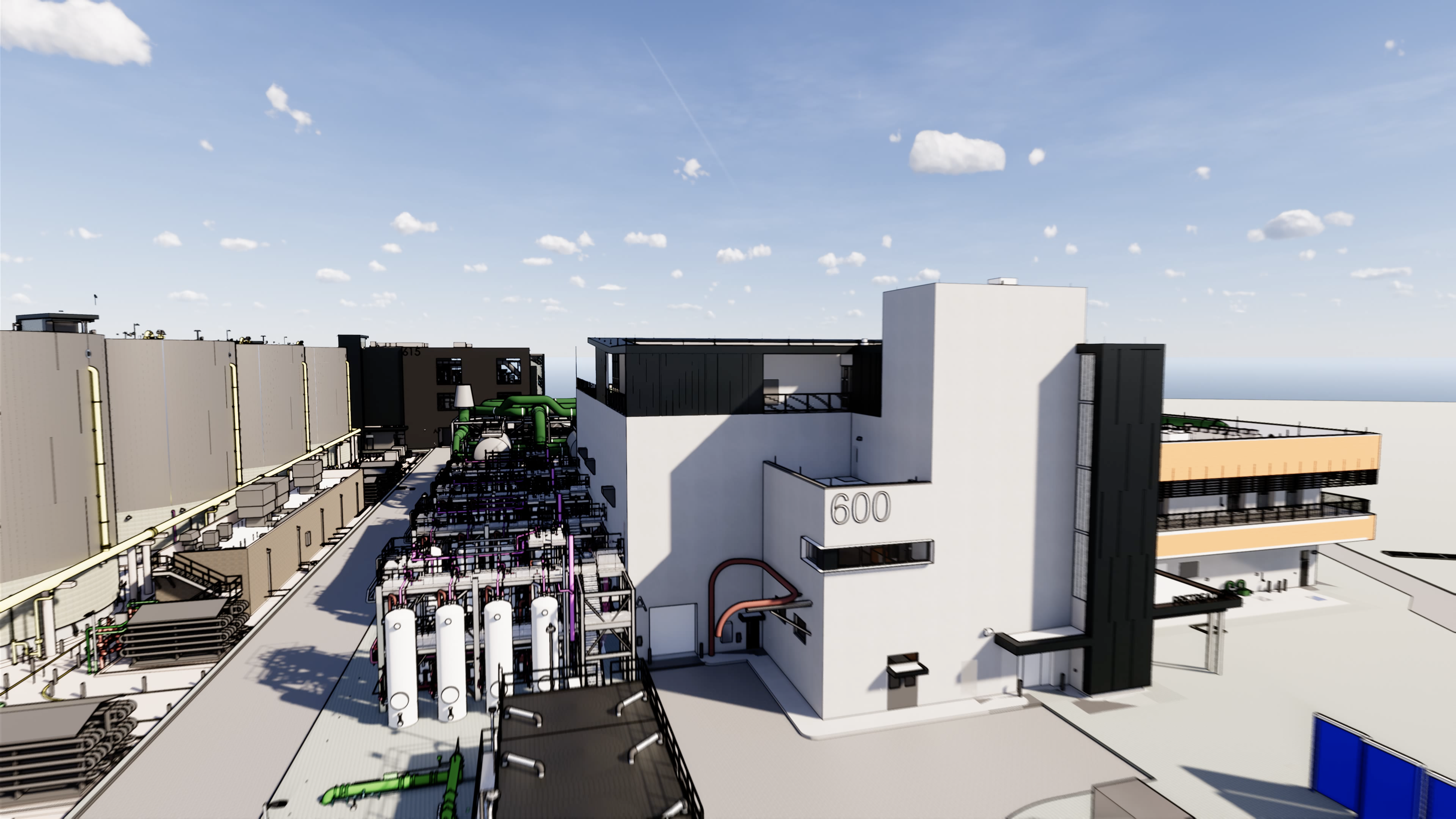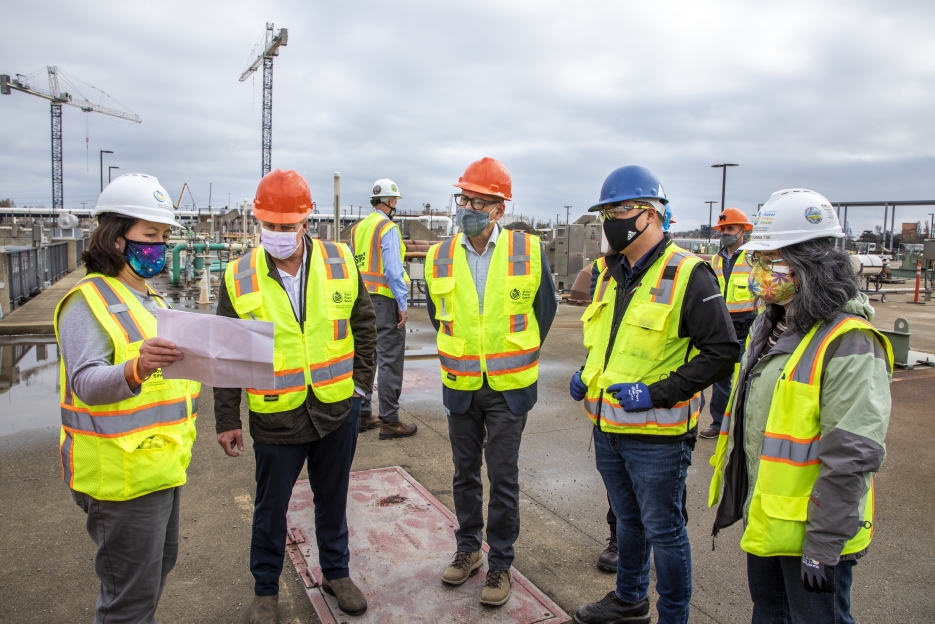 The San Francisco Public Utilities Commission’s Biosolids Digester Facilities Project at the Southeast Treatment Plant Earns Envision Platinum for Sustainable Infrastructure
The San Francisco Public Utilities Commission’s Biosolids Digester Facilities Project at the Southeast Treatment Plant Earns Envision Platinum for Sustainable Infrastructure
The San Francisco Public Utilities Commission’s (SFPUC) Biosolids Digester Facility Project is the recipient of the Institute for Sustainable Infrastructure’s (ISI) Envision® Platinum award for sustainable infrastructure. Platinum is the highest certification level based on ISI’s consistent, consensus-based framework for assessing sustainability, resiliency, and equity in civil infrastructure.
Envision was developed to evaluate, rate, and reward all types of public and private infrastructure projects.
“Achieving Envision Platinum is a major accomplishment, and it reflects the hard work of so many people at the SFPUC and in this community,” SFPUC General Manager Dennis Herrera said. “Environmental justice is at the forefront of our work, and this award underscores our commitment to a sustainable future, including the health and wellbeing of the communities in which we operate.”
The SFPUC is investing over $3 billion to upgrade and modernize the aging Southeast Treatment Plant (SEP) as part of a more extensive Sewer System Improvement Program (SSIP). The SEP is San Francisco’s largest wastewater treatment plant. Once the upgrades are finished, SEP will reliably work better, smell better, and be a more significant community asset. The SFPUC is also upgrading the SEP for earthquake preparedness, sea-level rise, and operational efficiency. In addition, the work will reduce odors and improve the quality of life for nearby residents and employees.
The Biosolids Digester Facilities Project (BDFP) is an essential component of the larger SEP upgrade. The BDFP project will replace and relocate the existing (and outdated) solids treatment facilities with more reliable, efficient, and modern technologies and facilities. This project will help transform the SEP into a modern resource-recovery facility, allow the SFPUC to meet its levels-of-service goals, and be an attractive place to work and visit.
Project objectives include:
— Construct new facilities with state-of-the-art treatment technologies to ensure continued regulatory compliance with present and projected regulations to protect public health and safety.
— Maximize the efficiency of the current treatment process operations and maintenance, staffing resources, and the use of existing SFPUC infrastructure.
— Ensure 100% of biosolids and biogas generated will be beneficially used.
— Build critical resources with redundancies to provide operational flexibility and reliability.
— Improve seismic reliability and design and site the new facilities to accommodate or adapt to anticipated sea-level rise.
— Limit odors and make visual improvements at the SEP to improve community quality of life.
— Maintain ratepayer affordability.
— Achieve timely construction of the facilities.
SFPUC is collaborating with Jacobs, Brown and Caldwell, Black and Veatch, and MWH Constructors-Webcor Builders Joint Venture to design and construct this Envision Platinum-verified project.
The Envision system examines the impact of sustainable infrastructure projects through five distinct categories: Quality of Life, Leadership, Resource Allocation, Natural World, and Climate and Resilience. These key areas contribute to positive social, economic, and environmental impacts on a community.
“This award was possible due to the incredible collaboration and synergy between the project management, construction management, design, environmental and operation teams,” said Carolyn Chiu, Project Manager for the project. “We understand the magnitude of this project, its impacts and its proximity to the community. We are devoted to being a good neighbor, and our goal was to leverage these investments to make positive impacts to support the community and environment.”
VERIFIED SUSTAINABILITY ACHIEVEMENTS
Creating jobs and student learning opportunities. The BDFP creates many new jobs during design and construction, including hiring local businesses (14.12%) and opportunities for student interns through the Young Community Developers internship program, which provides students with hands-on learning and mentorship opportunities.
Improving community attractiveness. Improvements along nearby Jerrold Avenue and Quint Street are included in the project’s scope, which will enhance the streetscape environment and improve overall safety. Enhancement measures include traffic calming, ADA-compliant curb ramps, paving, sidewalk replacement, lighting, crosswalk striping, stormwater retention, and landscaping features. Also, the neighborhood will benefit significantly from this project through improved facility aesthetics and odor control.
Adding public space and amenities. Typically, facilities like these are not accessible to the public; however, the project team saw an opportunity to change that. The project will provide educational opportunities for the public to visit the plant and learn about facility operations.
Protecting freshwater availability. The SFPUC, and the City and County of San Francisco as a whole, recognize that drought conditions and demands on freshwater will increase. Significant steps have been taken at the SEP to reduce the impact on freshwater supplies. No fresh water is used directly for process systems; instead, process systems utilize recycled effluent from the plant treated through filtration and UV disinfection. Furthermore, the BDFP will reclaim water from biosolids at the plant. The reclaimed water will be treated and reused onsite or discharged into San Francisco Bay.
Turning waste products into marketable resources. Biosolids produced from wastewater treatment processes can be categorized in four ways, with each class having clearly defined acceptable disposal methods. The BDFP is upgrading the existing SEP biosolids treatment from Class B to Class A (the highest class available), providing greater end-user security as biosolids regulations become increasingly stringent and restrictive. The project team conducted an extensive biosolids products and markets analysis. It determined that the total production of biosolids (i.e., biosolids cake for land application, compost, thermally treated products, and soil-blended products) is likely to be absorbed by the local or regional marketplace.
Leadership in sustainability. The San Francisco Environment Code (Code) requires LEED Gold certification for municipal construction; however, after thorough analysis, the team advocated for the use of Envision on this project, given its suitability for this type of development. Now Envision is being considered an acceptable standard going forward.
Remediating contaminated land. No undeveloped land is being used for this project; 100% of the project is located on a previously developed site consisting of residential, commercial, and light/heavy industrial uses. A remediation plan has been prepared and approved to remediate part of the site that contains hazardous materials and contaminated soils.
“The project team sought to have the sustainability goals of the project, owner, and team independently validated—and they did just that,” said Melissa Peneycad, managing director, ISI. “The team’s hard work and dedication to sustainability shone through their application. It is especially noteworthy that this team advocated for the use of Envision on this project as the most relevant and applicable standard by which to measure sustainability outcomes. Congratulations to all involved!”
The Sewer System Improvement Program
Every day, over one million residents, businesses, and visitors rely on our combined sewer system to protect public health and the environment. The investments at the Southeast Treatment Plant are part of the Sewer System Improvement Program (SSIP), a multi-billion-dollar investment to upgrade and modernize San Francisco’s critical sewer infrastructure with new technologies to improve operations, reduce odors, better manage stormwater, and safeguard against climate impacts, like sea-level rise. Projects across the City range from neighborhood green infrastructure like rain gardens that collect and clean stormwater to extensive treatment plant upgrades.

PROJECT DETAILS AT-A-GLANCE
Envision-Verified Project: Biosolids Digester Facilities Project
Location: San Francisco, California
Lead Envision Firm: Jacobs
Envision Rating: Platinum
Award Date: April 13, 2022
Project Owner: San Francisco Public Utilities Commission
Involved firms: Jacobs, Brown and Caldwell, Black and Veatch, MWH Constructors-Webcor Builders Joint Venture
Project Phase: Under construction
Project Delivery Method: Construction Manager/General Contractor (CM/GC)
For More Information: Visit the project website
Download the Project Profile & Award Announcement


